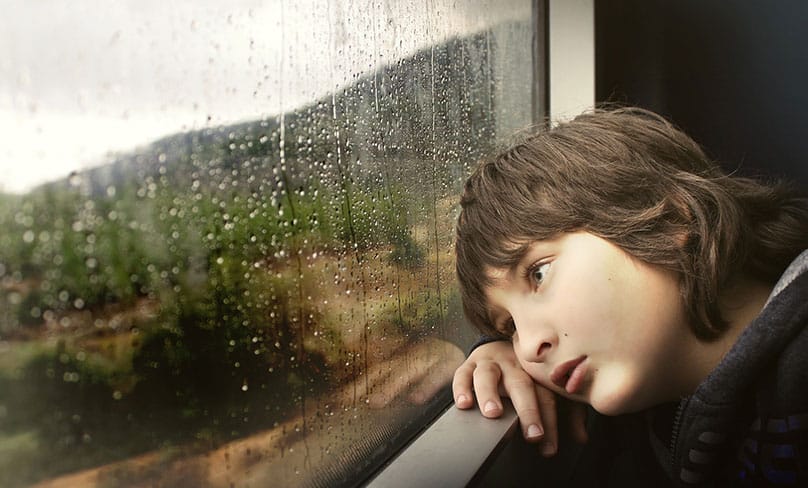
By Justin Coulson
I’m sure there really are kids out there who were excited about heading back to school after the summer holidays. But I don’t know any of them.
About seven percent of Aussie kids aged 4-17 years experience anxiety disorders each year, and school can be a major contributor.
Many kids experience anxiety – sometimes profoundly – with fears about new classes and teachers, or maybe even new schools and friends.
Anxiety can be hard to recognise in our children. They don’t typically say, “Mum, I’m feeling genuine and deep fear about going to school next week.”
For a start, they’re typically not that ‘verbal’, preferring to keep their fears to themselves. Secondly, they may not actually recognise what they’re feeling. As parents, our job is to watch for signs of anxiety so we can coach and support our children.
What does anxiety ‘look’ like?
See related article: Best Christmas present is your presence
Sometimes it can look like illness. ‘I don’t feel well’, or ‘My tummy hurts’, are common complaints. Other times it can show in the form of defiant or angry behaviour.
Back to school anxiety is very real and can be paralysing. But it doesn’t have to be. Name it, explain it, teach brave thoughts, and always, always give love and you’ll find anxiety significantly decreases (for your kids and you)!
By building strong relationships with peers and school staff, establishing calm, clear, predictable routines at home, and emphasising fair expectations that suit your child and his or her temperament, anxiety can be reduced, and going back to school can be easier for everyone.
Try these ideas to help ease the transition from holiday time to school time:
1. Build Relationships
One of the best predictors of children’s wellbeing at school is the quality of their relationships. Put simply, kids typically like school when they’ve got good friends there. In these first few weeks of school make an effort to get your kids involved with other children in the holidays, on the weekend, and after school.
2. Get Routines Right
In my book, 21 Days to a Happier Family, I highlight the way that routines make life easier because we free up cognitive space. When we have a routine (and a checklist!), we don’t have to think. This means less anxiety and more efficiency. So focus on a morning, afternoon, and evening routine.
Mornings should be built around waking up at the right time (or even a bit early), eating good food, preparing good food for the day, and leaving on time.
Afternoons should be focused on rejuvenation and recovery from a long day. A bit of down time before extra-curricular activities, reading, or household chores (or homework for older kids) can go a long way to making the afternoon go well.
Evenings should emphasise relationships and nurture, reduced screen-time, and plenty of sleep. We also want to get things ready for the morning. Prepping uniforms, shoes, lunchboxes and so on can make mornings magic, rather than mayhem. Remember, your morning starts the night before.
See related article: Tips for when your teens become ‘allergic’ to you
3. Set Your Own Expectations Appropriately
One of the biggest issues for children in school is parent expectations. The increasing demands on students from well-meaning parents who want their kids to be A-students is often detrimental. Children are expected to do more ‘learning’ and less playing at younger and younger ages. We submit them to all manner of tests, NAPLAN being the most famous, and apply pressure with ever-increasing expectations.
If your kids are in primary school, consider dropping homework from your schedule entirely. Research evidence indicates it doesn’t help, and often hinders, learning. Instead, encourage reading, and read with your kids. Make it stuff they want to read.
Pull your kids out of NAPLAN. It’s allowed. If you choose not to go that far, let them know you aren’t bothered at all by what they score. Let them know it’s really a thing for the government and their school. And make sure the school isn’t putting any pressure on the kids (or practicing for the test, or restricting play time or art/drama/music/sport time because of the test).
Finally, consider the amount of extra-curricular activities they’re involved in. Childhood is certainly about development, learning, and extending talents and abilities. But it’s also about play, freedom, and being allowed to be little.
Dr Justin Coulson is one of Australia’s leading experts in the areas of parenting, relationships and wellbeing. He is an international speaker, podcaster and author of three books including 21 Days to a Happier Family (Harper Collins, 2016) and 9 Ways to a Resilient Child (Harper Collins, 2017).
He and his wife Kylie are the parents of six daughters. When he is not spending time with his family he can be found doing TV and radio appearances as well as travelling around the country delivering talks and workshops at schools and organisations helping parents, students and staff improve their personal and professional relationships. For more see happyfamilies.com.au
